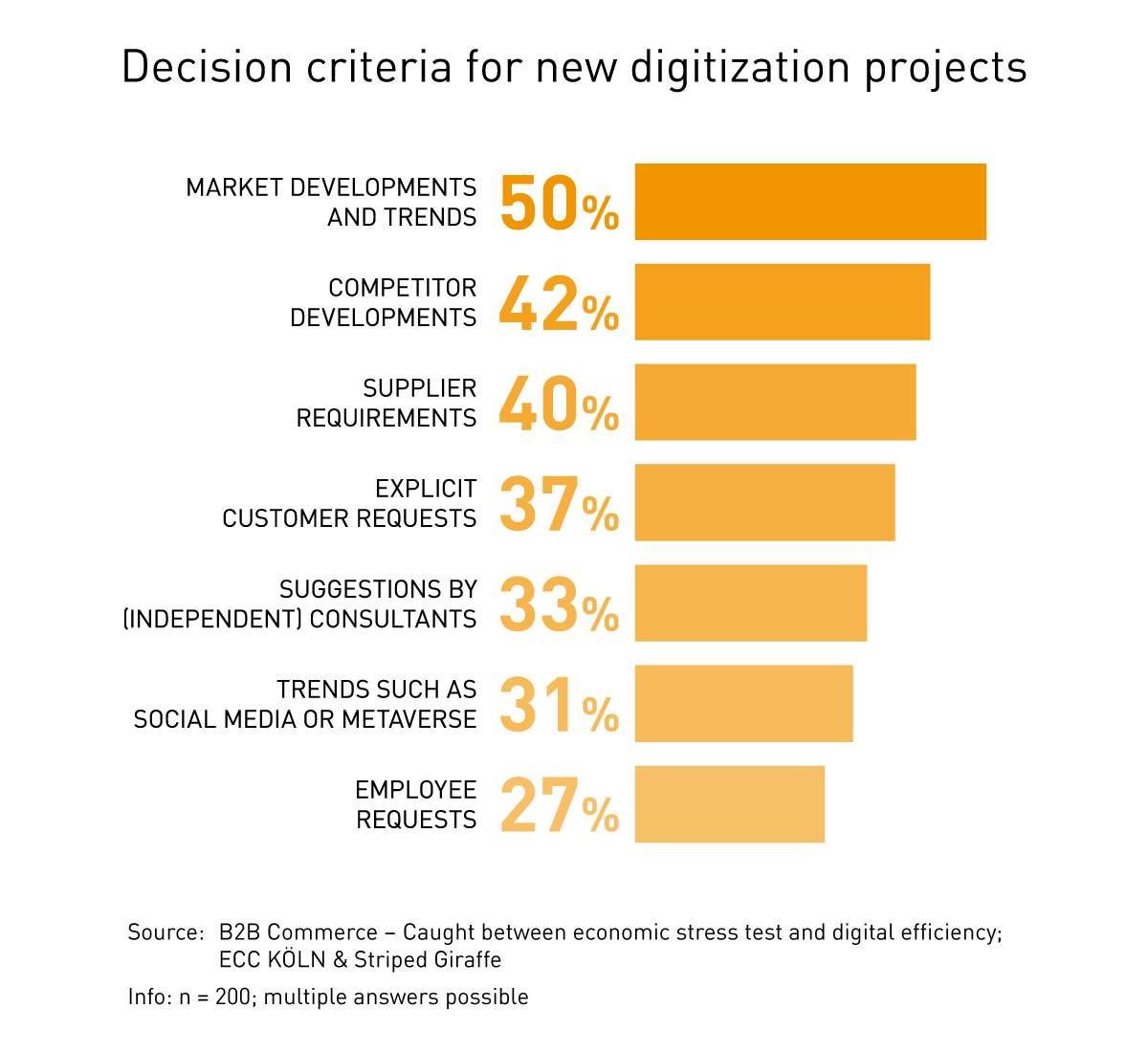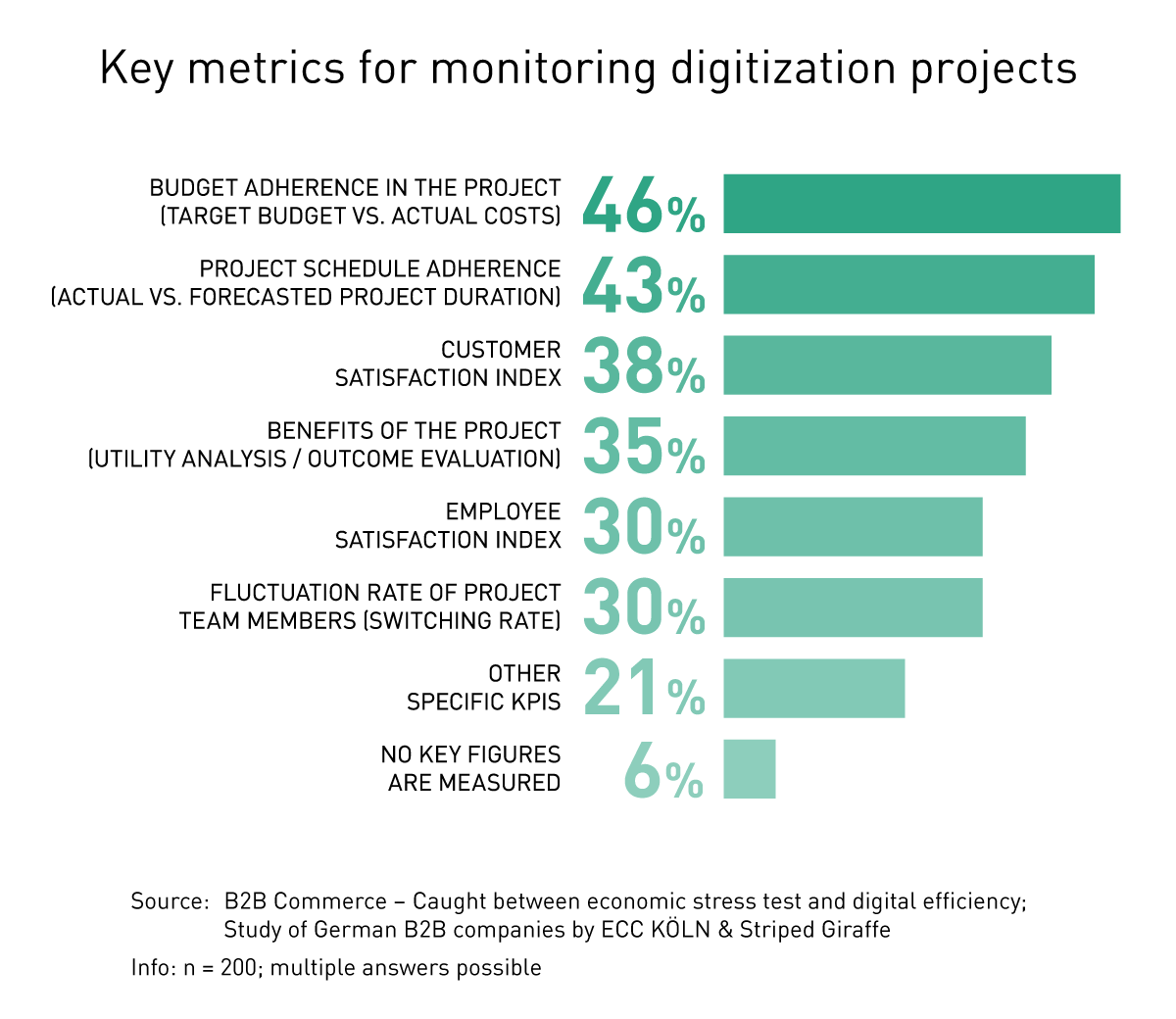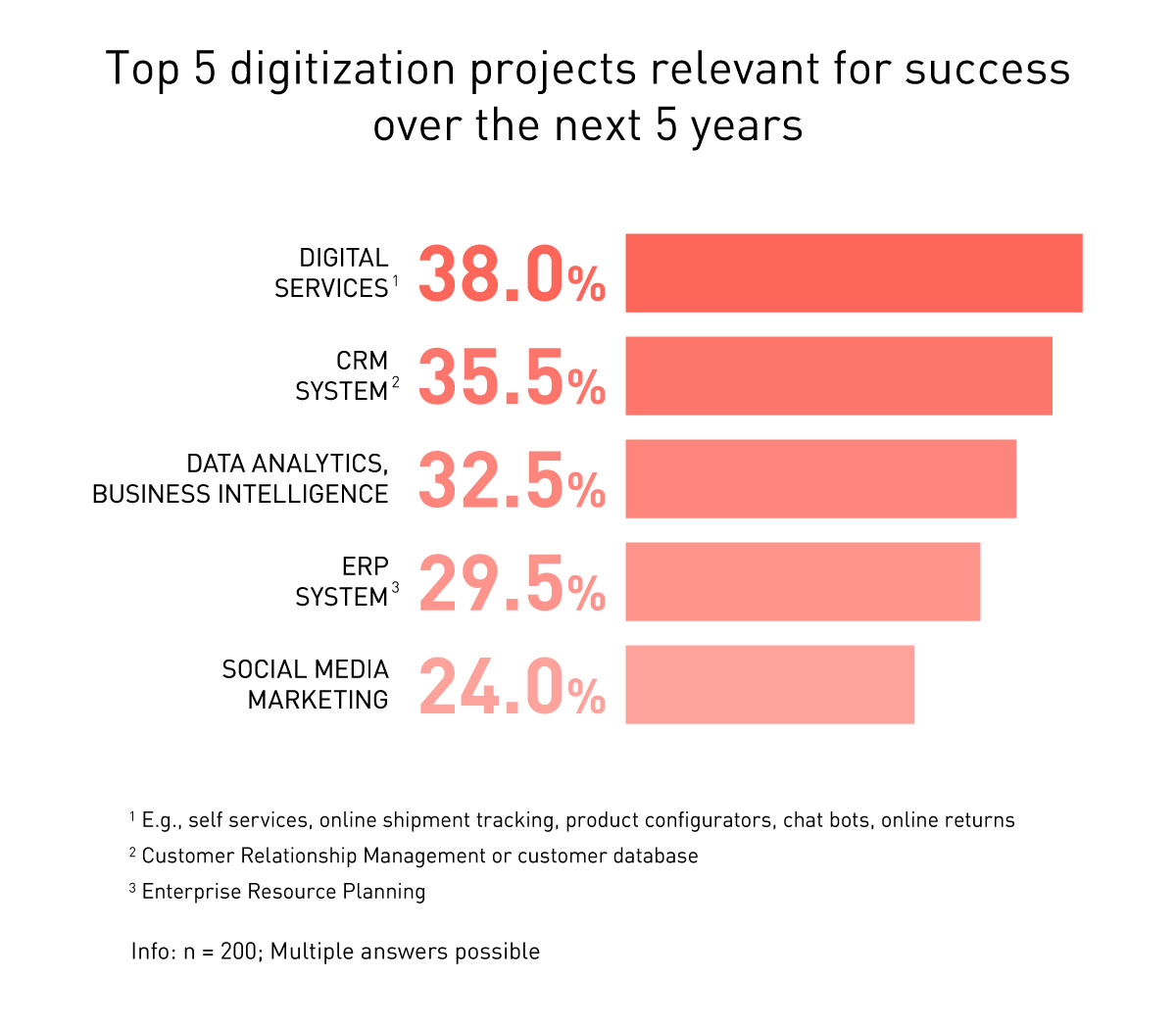
Fact check for digitization projects
As a B2B company, we are constantly involved in digitization projects. After all, the key to success lies in the right digitization. However, these undertakings are associated with numerous challenges and pitfalls. And it is not uncommon for projects to fail or not lead to the desired result. For this reason, we have joined forces with ECC KÖLN to conduct a study that takes a closer look at this topic.
“B2B Commerce – Caught between economic stress and digital efficiency” is the name of our study. While the first part deals with current crises, countermeasures taken and developments in e-commerce and pricing policy, the second part is about how to approach digitization properly as a B2B company.
Start of the digitization project
In the beginning, we always deal with questions like:
- What do we want to achieve?
- Why?
- And how do we get there?
Different departments have a stake in this. When it comes to digitization projects, the IT department is naturally heavily involved in all aspects. When it comes to the budget, management has the final call (52%). But Sales is also involved in the decision-making process when it comes to general implementation (33%) and the project schedule (35%).
But what are B2B companies guided by when it comes to deciding on new digitization projects?
As we know, customer-centricity is the only right approach. Therefore, customer needs should come first. You would expect.
But the survey revealed that most (50%) are guided by market developments and trends or, even more curiously, by competitors’ developments (42%). 40% take supplier requirements as the reason for digitization projects. Explicit customer requirements barely make it into fourth place (37%), just ahead of suggestions from independent consultants (33%), trends such as social media, metaverse, etc. (31%), and employee requirements (27%).

We were very surprised by these results. However, they also provide a good explanation as to why many companies are dissatisfied with the results of digitization projects or why the desired success does not materialize. But more on that later.
It all comes down to the right basis
Data is one of a company’s most important assets – if it is analyzed, processed, and used appropriately. We also took a closer look at this topic in the study.
On which data are decisions for digitization projects based?
The majority (41%) limit themselves to internal data such as sales/turnover figures, profit margins, customer data, etc.
34% draw exclusively on external data for decision-making. This includes data from market research or consulting projects, secondary data, market figures, etc.
Both variants exclude a holistic approach, which is, however, essential for future-oriented decisions. This was understood by 20% of the B2B companies surveyed, which use both internal and external data. Manufacturers (26%) in particular rely on this approach. Only 14% of wholesalers agree.
Most fatal, however, is the practice of 5% of respondents who do not use any data at all for their decision.
And what if digitization projects fail?
Regardless of company size, the manufacturers and wholesalers surveyed have initiated an average of eleven digitization projects in the last five years. But of these, 80% of the companies have abandoned projects, and 10% even more frequently. How can this happen?
The reasons are manifold. It starts with the widespread lack of personnel (33%), continues with problems with the service provider (29%) and underestimated effort (28%), and ends with insufficient requirements analysis (19%) and a lack of know-how in the company (16%).
When there is not enough staff or the required skills are lacking, companies are happy to turn to specialized service providers. But this does not necessarily mean that they deliver what they promise. After all, 60% of respondents have changed their service provider more than once in the last five years. Only 30% were or have been satisfied with their service provider since then.
Changing service providers is an expensive business. A lot of time and money may have already been invested in a project that was then canceled. Termination of the collaboration can lead to extra payments. The search for a new service provider is also time-consuming.
If you do not have recommendations for a suitable service provider or do not want to rely on them entirely, you need to conduct a proper screening. This includes precise goal setting and a detailed requirements analysis in advance.
After all, among digitization projects carried out in the last five years, 24% of B2B companies are fully satisfied with them, 70% mostly. Only 6% stated that the projects were not worthwhile. This is mainly because processes were not really improved as a result. In 46% of cases, the costs were higher than planned and the cost-benefit ratio simply did not fit.
All of these negative outcomes can almost be avoided with careful planning in advance and a focus on customer needs
Gunnar Rohde, CEO and Head of E-Commerce at Striped Giraffe.
When are digital projects successful?
There are several key figures for measuring the success of a digital project. It is important to determine in advance which ones should be used for measurement. For 46% of respondents, the key metric is adherence to the planned budget, closely followed by adherence to deadlines (43%). This is followed by the customer satisfaction index (38%) and the utility value (35%) of the project.

Everyone must decide for themselves which KPIs (Key Performance Indicators) are relevant – but as mentioned, please do so in advance. On average, companies measure 2.43 key performance indicators. It is extremely problematic if nothing is measured at all. 6% of B2B companies admitted to this.
One KPI that should not be underestimated is ROI (return on investment). This is measured by 87% of those surveyed. Surprisingly, however, for 36% it has no significant influence on further activities or decisions. In this case, the question arises as to why it is measured at all.
Recognizing good service providers
With all the measurements of project success, the question is how service providers are actually measured. Here, as many as 48 % state that they define precise KPIs in advance. 44 % rely on the satisfaction of project staff. It is also important that set milestones are achieved (34%) and that the agreed service level agreement is adhered to (25%).
But here, too, 9% of B2B companies do not measure the performance of their service providers at all. This means that an objective assessment is not possible. In addition, service providers cannot then be compared with one another. But that is precisely what is important if you want to find the right one in the large range of services on the market.
Digitization projects of the future
Let’s take a look into the future. Which digitization projects will be relevant for B2B companies in the next five years to ensure economic success?
Everyone agrees on this question – be it manufacturers or wholesalers, medium-sized companies or corporations. They all want to offer their customers digital services. And they are right to do so. Because these are becoming increasingly popular with customers in the B2B sector as well.
Data analytics and BI projects, as well as CRM and ERP systems, take the next places.

All results can be found in the 2nd part of our study “B2B Commerce – Caught between economic stress test and digital efficiency”, which you can download here for free.
+49-89-416 126-660

